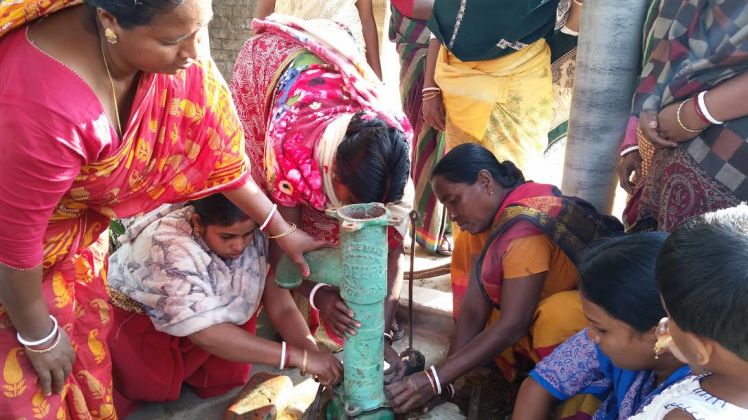 Emil, Kristine S and Henrik visited the resilience project area last week in order to plan and start up collection of data for the coming up project evaluation in April, and to plan for a new project with JGVK. The 3 years and 9 months resilience project comes to an end in May, and it has produced a lot of significant results. Among them are a consciousness of how and why the villagers should care about embankments and save water, form village committees, self help groups and water user groups and maintain their public handpumps. Women groups are now active in 50 villages by proposing solutions to relevant government decisive and financial bodies, that were formerly only addressed by men.
Emil, Kristine S and Henrik visited the resilience project area last week in order to plan and start up collection of data for the coming up project evaluation in April, and to plan for a new project with JGVK. The 3 years and 9 months resilience project comes to an end in May, and it has produced a lot of significant results. Among them are a consciousness of how and why the villagers should care about embankments and save water, form village committees, self help groups and water user groups and maintain their public handpumps. Women groups are now active in 50 villages by proposing solutions to relevant government decisive and financial bodies, that were formerly only addressed by men.
As a result of the proposals, many solutions have been established, like sinking of tubewells with hand pumps, repairing pieces of embankments, raising and repairing roads that can be used during the monsoon. Self help groups also take their own activities to breed and plant mangrove and vetiver grass to protect embankments from erosion, promote small scale rainwater harvesting at household level, growing crops in flexible bags and floating gardens, that can be moved and kept during a flood. Many of the villages have established village level task forces and disaster risk mitigation committees, so it is known who will take care of first aid, water supply, sanitation etc in case of an emergency. We expect the rest of the villages will have these committees before the project is over.
In spite of the above mentioned improvements, there is still room for strengthening resilience in the area, as the situation is still poor and vulnerable. Especially lowering of the groundwater level is os of great concern. Around 95 % of the decrease in groundwater level is caused by irrigation of rice with groundwater. This is still not effectively stopped during this project. Another thing is, that some embankments need further investments from a higher level in the governmental system than we have been able to reach in this project. Therefore we decided with the project staff to develop a future project on sustainable water resources management management, to address these problems. The India group will work intensively on this application until 15 March. If someone has skills and time to join this work, please contact india@ubu.dk.

You must be logged in to post a comment.